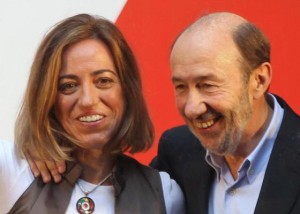
The Socialist conference in Seville, where a new leader will be chosen this weekend, is supposed to set the tone for the party for the next few years. But the weeks leading up to the event have been dominated more by rumour and intrigue than ideas.
This hearsay and speculation has focused in great part on which of the two candidates certain heavyweight party figures will put their weight behind. For example, whether José Antonio Griñán, Socialist leader in the party’s stronghold of Andalusia, will support Alfredo Pérez Rubalcaba or Carme Chacón. Reports suggest he will back the latter, but former Prime Minister Felipe González, by contrast, has come out in favour of the veteran Rubalcaba – a major boost according to some, the kiss of death, say others. These decisions will turn out to be key on Sunday, when over 900 Socialist delegates will cast their votes.
But there has also been intrigue of a less savoury sort in recent days, following El País newspaper’s publication of a long feature about Chacón. The article presents the 40-year-old former defence minister as a fiercely ambitious politician who is surrounded by a shadowy cabal of advisors, including her husband, Miguel Barroso. It also suggests that a large faction of the party mistrusts Chacón and her posse, and that victory for her on Sunday would be a gamble for the already beleaguered Socialists.
“Rubalcaba is putting himself forward as a candidate in order to prevent the party from falling into the hands of a conglomerate of interests which are the same as those that have caused the party to lose strength,” one of several unnamed sources is quoted as saying.
The ensuing furore has, perhaps inevitably, seen conspiracy theorists identify former prime minister Rubalcaba as the mastermind behind the article’s publication. The upshot of all this is that regardless of whoever really was behind it, both candidates have suffered.
But all this cannot disguise the fact that neither Chacón nor Rubalcaba has managed to outline a coherent and convincing vision of how they would lead the party.
Admittedly, that’s no easy task, given the debacle of 2011, when the Socialists suffered record losses in both local and general elections. Party membership is down and José Luis Rodriguez Zapatero left the prime minister’s office with his approval ratings on the floor, having embarked on a dramatic, Brussels-decreed policy swerve towards neo-liberalism.
Being in a position to win elections again could be a tall order any time soon, including March’s key regional vote in Andalusia. Boosting party membership will also be a long-term goal. So the priority for the Socialists has to be to recover a sense of identity, to explain what they stand for at a time when their traditional policy cornerstone of government spending is so severely restricted by circumstance.
And yet, neither Chacón nor Rubalcaba has offered a clear idea of what that identity should be. Slogans have been bandied about offering “change” and “renewal”, but in the public sphere, at least, there has been precious little discussion of issues. When Chacón says that the “party needs to be recharged”, or that “Socialism is a cause that has no boundaries”, what does she mean?
The Zapatero factor
One problem both candidates have is that they are contaminated somewhat by their recently held positions in the Zapatero administration. If they break with the previous government’s policy, as Rubalcaba has done in suggesting Spain should delay certain economic commitments made to the EU, they can look hypocritical, flip-floppy or even unfaithful; if they don’t, they look like Zapatero Mk. II.
That second predicament is one Rubalcaba is determined to avoid, having been the most powerful figure in the latter stages of the Zapatero government. But the same applies to Chacón, especially after El País’s claim that she is something akin to a Zapatero puppet, intent on extending his influence.
This party conference was planned as an opportunity for the Socialists to unite and find a renewed sense of purpose. But the signs are that the current divisions could remain long after the new leader is chosen; and worse, that after this weekend the party still won’t know exactly what it stands for.
Leave a Reply
You must be logged in to post a comment.